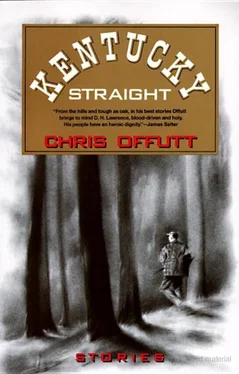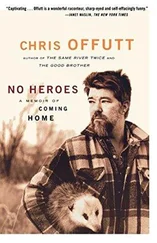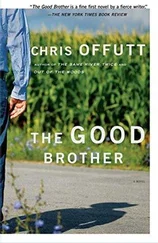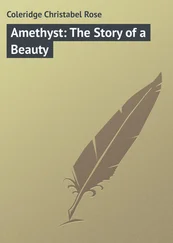Chris Offutt - Kentucky Straight - Stories
Здесь есть возможность читать онлайн «Chris Offutt - Kentucky Straight - Stories» весь текст электронной книги совершенно бесплатно (целиком полную версию без сокращений). В некоторых случаях можно слушать аудио, скачать через торрент в формате fb2 и присутствует краткое содержание. Год выпуска: 1992, Издательство: Vintage, Жанр: Современная проза, на английском языке. Описание произведения, (предисловие) а так же отзывы посетителей доступны на портале библиотеки ЛибКат.
- Название:Kentucky Straight: Stories
- Автор:
- Издательство:Vintage
- Жанр:
- Год:1992
- ISBN:нет данных
- Рейтинг книги:5 / 5. Голосов: 1
-
Избранное:Добавить в избранное
- Отзывы:
-
Ваша оценка:
- 100
- 1
- 2
- 3
- 4
- 5
Kentucky Straight: Stories: краткое содержание, описание и аннотация
Предлагаем к чтению аннотацию, описание, краткое содержание или предисловие (зависит от того, что написал сам автор книги «Kentucky Straight: Stories»). Если вы не нашли необходимую информацию о книге — напишите в комментариях, мы постараемся отыскать её.
Kentucky Straight: Stories — читать онлайн бесплатно полную книгу (весь текст) целиком
Ниже представлен текст книги, разбитый по страницам. Система сохранения места последней прочитанной страницы, позволяет с удобством читать онлайн бесплатно книгу «Kentucky Straight: Stories», без необходимости каждый раз заново искать на чём Вы остановились. Поставьте закладку, и сможете в любой момент перейти на страницу, на которой закончили чтение.
Интервал:
Закладка:
Because Little Elvis wanted to be a man, I took him out to the White House and we hung our feet down through the hole. He sang, “We’re stinking our feet like old dead meat,” over and over. Mud daubers had tunneled a nest in a high corner and I seen them but it was too late. They landed on Little Elvis’s head and started biting and he tried to run, but forgot he was stinking his feet and fell through the hole. He grabbed hold of my legs. Then the mud daubers were on me and I screamed for Granny. She came out and said later she’d thought one of us had an eye poked out from all the hollering. She saw me half down the toilet hole and took me by the arm like I was laundry. Granny worked past me to snatch Little Elvis by the hair and haul him up, his head one red bump from mud dauber bites and his feet stinking all the way past his knees. Granny about busted the White House roof off laughing. She said Daddy fell in once when he was a boy, and Little Elvis thought that made it ok.
“In here?” he said. “Daddy fell in here?”
“No, it was a different place,” Granny said.
What they did back then was move the White House when the hole filled up and she said Daddy’s old hole was over where the turnips were growing now. Little Elvis got the idea that Daddy’s feet stunk from turnips. He stomped them all summer, not leaving none to eat, and groundhogs got the mush. He’d lay in the dirt and sing, “Daddy’s feet don’t get burn up ’cause he mashed them in a turnip.” The only way of keeping him out of the garden was tying him to the door but Granny’s hands were too stiff and twisty for making good knots. I turned him loose every day.
By now we called Granny the fuck-you-bitch to her face because she locked us outside till dark, then made us take our clothes off and hose each other down before we could eat supper. We weren’t allowed to wear anything in the house because of the dirt. All summer our shirt and pants laid outside overnight. Some mornings, we found Daddy laying out there, too. His head hurt so bad he had me water him with the hose. Little Elvis would sniff at Daddy’s boots so he’d know man-smell against the time he was one. Daddy said we were a damn sure pair of stand-up boys.
When the sun moved over the ridge, he crawled to shade and along noon he’d light a cigarette and talk to us. “Shoot to kill,” he said, “never wound. Fold a three-flush after five. Don’t give women gifts. Always throw the first punch.” Stuff like that he’d tell us, useful stuff that we were supposed to never let go of. I didn’t, but Little Elvis can’t remember much from day to day except food. Once he forgot how to ride a bike and I had to learn him all over again.
One day we found Daddy asleep in a car behind the house. He let us help him take it apart, and we threw hubcaps, headlights, and bumpers in the river. He unscrewed a quarter panel and put me and Little Elvis to tearing it up with tire tools. We beat and scratched until the car was stripped down like a go-cart and you could see how the gears worked. We broke all the glass out, too. Daddy stuck the big pieces in the back of his truck and drove away.
He came back with half-melted ice cream cones from Rocksalt and we ate what was left of them, looking at the car. Daddy said we could make a dune buggy of it. He’d drive us anywhere we wanted to go — wherever, we’d just go with sleeping bags, fishing rods, and night crawlers. We’d see the world living on fish and ice cream. And siphoning gas at night.
While we sat there watching the river, two police cars came to block our road. A big bald-headed cop told Daddy to sit on the grass while the short cop talked on a radio. Daddy didn’t say nothing, he just sat. Two more cars showed up, not police cars but regular cars. The men weren’t wearing cop suits but they acted like they were, and when one took his coat off against the heat, he had a pistol on a strap that went over his shoulders. He put the jacket back on when the bugs got to him. They’re bad on the river but they don’t bother me and Little Elvis because Daddy said we’re river rats and mosquitoes know better than to fool with us.
The two cops who weren’t cops had clipboards. They looked that car up and down with me watching and Little Elvis out front riding his bike and singing, “Police car squashed my daddy, police car squashed my daddy.” He rode in a circle, which he’s not good at, and kept wrecking until Daddy took him in his lap.
The man with the hid gun said, “It looks like the car all right.” Then he asked me how long it was here.
“What,” I said, “the river?”
He didn’t like me saying that, which was fine by me because I didn’t like him telling Daddy to sit under the tree. Not even Granny tells him what to do.
“We need a warrant,” the other man said. “Nothing that kid says will do us any good.”
He smiled at me the way I’ve seen teachers smile when they think I done something bad and they’re pretending it ain’t bad so I’ll talk about it and they can give me a paddling. I got twelve licks once. Six for saying thank you when the teacher said I was wise, and six more for laughing after the first six licks. I had to laugh because I couldn’t cry in front of everybody. Daddy said river rats never cry.
The men who weren’t cops had that look on their face, like they wanted to give me a paddling but didn’t have the reason yet.
“How long’s this car been here, son?” the smiling one said.
I looked at him and then at the car, and I could hear Little Elvis singing.
“I ain’t your son,” I said.
The other man shook his head.
“That’s my car,” I said. “I’m putting it together. Daddy ain’t helping or nothing. We’re aiming to dune-buggy it on out of here.”
One man laughed but the second one got that teacher look again, like he finally had his reason for a whipping.
“There’s not a dune for a thousand miles any direction from here,” he said.
When I told the funny-talked lady all this she said that’s what she meant about precocious, how telling the cops that lie was precocious. I didn’t like her knowing right off it was a lie because when Daddy heard me say it, he said it was the pure truth. The bald cop pulled out handcuffs and the short one said, “Not in front of his kids.”
They made Daddy get in the back seat of the police car. They drove through the yard to the road, leaving big tracks in the grass and I wrecked my bicycle trying to catch up, bent the rim bad. I pushed it back to Little Elvis, who was sitting with his bike in a big mud hole. When I couldn’t get him to come out, I sat down with him. We smeared mud on our faces and planned to break Daddy out and they’d not know who it was because of the mud.
The funny-talked lady grinned over that and said, “Some people don’t always cooperate with people who can help. I hope you’re not one of them.”
I didn’t say nothing and she asked if there was anything I needed. I’d never thought I needed anything but if she was asking, maybe there was. So I said, “To get Little Elvis back from the place the state put him.”
I missed hearing him sing those songs even if they were dumb as ditch water. Many’s the time I tried to make some up but they never came out right. Daddy always did say I sang like a combination lock, no key. It was Little Elvis who got the talent in our family, which was ok with me.
I wouldn’t mind too bad talking to Daddy over that tore-up car business either. The owner was the same man whose dog treed me and who Daddy knocked down. I was the one who had to go and climb that pine and get the dog killed, Daddy locked up, and Little Elvis took.
I reckon Mommy’d never run off if I hadn’t busted in on her and that neighbor man one night when I couldn’t sleep for the racket they were raising. I screamed out, “You ain’t my daddy.” He looked at me back over his shoulder from where he was hunkered down in the middle of the bed like picking worms off tobacco and said, “Damn sure ain’t, runt.” He kicked me full in the head barefoot. Then he slapped Mommy in the jaw and I seen her naked buried under him with her hair in her face, and her eyes crazy.
Читать дальшеИнтервал:
Закладка:
Похожие книги на «Kentucky Straight: Stories»
Представляем Вашему вниманию похожие книги на «Kentucky Straight: Stories» списком для выбора. Мы отобрали схожую по названию и смыслу литературу в надежде предоставить читателям больше вариантов отыскать новые, интересные, ещё непрочитанные произведения.
Обсуждение, отзывы о книге «Kentucky Straight: Stories» и просто собственные мнения читателей. Оставьте ваши комментарии, напишите, что Вы думаете о произведении, его смысле или главных героях. Укажите что конкретно понравилось, а что нет, и почему Вы так считаете.












